In July 2020 the European Space Agency’s Earth Observation for Sustainable Development (EO4SD) Climate Resilience Cluster hosted a free webinar series providing insight about the potential of Earth Observation (EO) to support climate-resilient decision making at the regional and national scale. All the webinar materials are now available to watch and download for free using the links below.
The popular series of seven webinars provided hundreds of participants with a foundational knowledge of EO and how it can be applied practically in the context of climate-resilience projects and programmes. The webinars featured real-world examples of how EO services have been applied during EO4SD Climate Resilience Cluster’s experience working with leading international finance institutions including the Asian Development Bank, The World Bank, the International Finance Corporation, Africa Risk Capacity and the Multilateral Investment Guarantee Agency.
Watch the webinar recordings and download the materials for each session using the links below
Webinar 01 - Setting the Scene: The climate resilience challenge and how ESA is responding - Click here for webinar recording and materials.
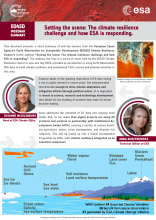 |
|
The first webinar of this series sets the scene by summarising the European Space Agency’s current and planned activities in the climate domain, introduce the nature and scope of the ESA E04SD Climate Resilience Cluster, and provide an overview of the scientific and policy context to climate action. |
Webinar 02 - The how, when, and why of using EO data in Climate resilience decision-making Showcase 1: Agricultural livelihoods & water - Click here for webinar recording and materials.
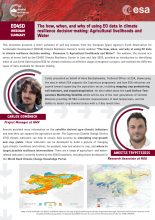 |
|
The second webinar of this series introduces the use and benefits of EO-derived data and services in climate resilience decision making in climate resilience decision-making in the agriculture and water sectors. As one of the most climate-dependent sectors, agriculture can be highly vulnerable to the impacts of slow-onset climate change and the increasing frequency of high-magnitude events. In economies highly dependent on agriculture, climate impacts can elevate risks of food insecurity, loss of livelihoods and export revenue, and heightened competition among water users (among others). All of these can elevate both social and macroeconomic instability that place constraints on prosperity and development. |
Webinar 03 - The how, when, and why of using EO data in Climate resilience decision-making Showcase 2: Urban resilience & environmental & natural resources - Click here for webinar recording and materials.
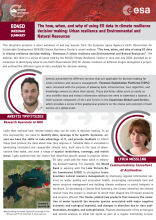 |
|
The third webinar of this series introduces the use and benefits of EO-derived data and services in climate resilience decision-making in the areas of urban resilience and environmental and natural resources. Climate change is putting considerable stress on urban areas, driven by hazards such as increasing extreme heat, fluvial flooding and sea level rise. These hazards can increase risks to human health, property, and the performance of critical urban infrastructure. At the same time, the environmental services on which such areas depend are also being impacted. EO data can be used to bring high-resolution insight anywhere in the world to inform a range of decisions, from informing ‘climate-adaptive’ building design to helping to identify opportunities for climate resilient development and economic activities in coastal areas. |
Webinar 04 - Water world: How EO data is deepening our knowledge of flood risk and water resource management - Click here for webinar recording and materials.
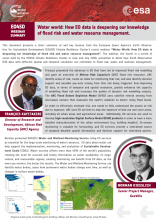 |
|
The fourth webinar of series presents in detail how EO data with different spatial and temporal resolution can contribute to flood risk, water and wetness management. EO data and services are vital tools for the water sector, supporting flood events, and conducting wetland inventory status in rural and urban areas. EO provides valuable information (Flood extent, historical flood events etc.) with the aim to assist authorities to prepare the most effective actions to manage flood risk and develop plans to tackle disasters. |
Webinar 05 - Is this drought normal? How EO data can help you understand drought hazard and benchmark your risk - Click here for webinar recording and materials.
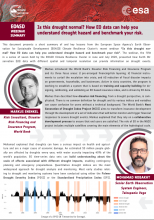 |
|
The fifth webinar of this series presents how Earth Observation data with different spatial and temporal resolution can provide information on drought events. Drought is one of the main natural causes of agricultural, economic, and environmental damage. The effects of drought on the environment and agriculture are evident after a long period with a shortage of precipitation, making it very difficult to determine the onset of drought, its extent and end. The EO time-series datasets can build understanding about the scale of effects associated with different drought impacts, helping to develop early food security assessments in specific geographic areas or contingency planning and emergency preparedness for future shocks in a country. It can also improve understanding of the drivers and causes of food insecurity in areas and identify which investments or risk management strategies are best. |
Webinar 06 - ‘How to’ Session: Using the EO4SD CR Platform to access EO data (hands-on) - Click here for webinar recording and materials.
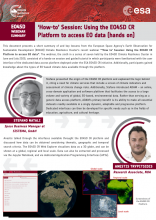 |
|
The EO4SD Climate Resilience cluster project has deployed a web based (EO4SD CR) platform to provide climate action programmes with enhanced climate risk management capabilities allowing users to explore the data and apply on demand analytics. This sixth webinar of this series is a hands-on session and a guided tutorial in which structured exercises enable participants to familiarize, navigate and extract the information required in their assessments. |
Webinar 07 - ‘How to” Session: Using Jupyter Notebook to access EO data (hands-on) - Click here for webinar recording and materials.
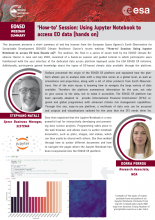 |
|
An extension of webinar 06, webinar 07 is a hands-on session and guided tutorial for advanced users to explore how to use the EO4SD CR platform Jupyter Notebook, including structured exercises of how to access EO data, conduct analyses and extract data time series. |









